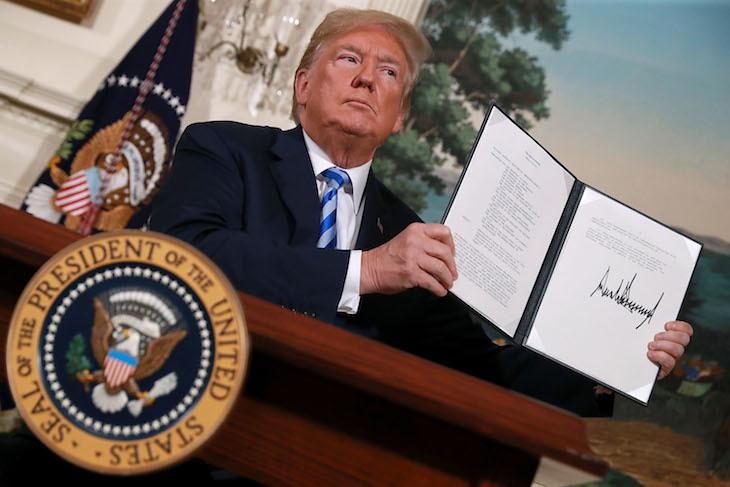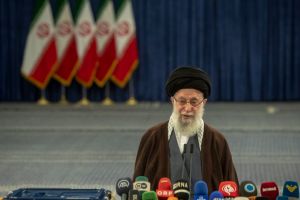In the White House on Tuesday, with the world just where he wanted it — eyes on the TV, transfixed by his boldness — President Trump uprooted the Iran nuclear deal. Under this agreement, which was signed in July 2015 by Iran and the five permanent members of the United Nations Security Council, plus Germany, the Iranians mothballed significant parts of their rapidly advancing nuclear industry in return for sanctions relief. The country is now considerably further away from a bomb than it was before, and its nuclear facilities are subject to inspections of unusual intrusiveness. In March Gadi Eisenkot, Israel’s chief of the general staff, affirmed that the agreement ‘is working and is putting off realisation of the Iranian nuclear vision by ten to 15 years’.
Trump was swayed not a scintilla by any of this — nor by France’s President Emmanuel Macron, Germany’s Chancellor Angela Merkel and our own Boris Johnson, who all trooped out to Washington to dissuade him from pulling out. Trump has chosen the hardest exit. He is demanding that foreign companies wind down their trade with Iran within six months and threatens secondary sanctions against any commercial entity which defies him. His administration will also exert itself to stop Iran selling oil on international markets, drying up the country’s main source of income.
Why did the President destroy an arrangement that had prevented Iran from advancing towards a bomb, applied a balm of predictability to one of the most livid issues in the Middle East, and created conditions for more diplomacy?
The first reason for his actions — as with so much he does — is his obsessive loathing for his predecessor. Trump’s barb on Tuesday, ‘the United States no longer makes empty threats’, was aimed as much at Barack Obama as it was at Iran. Then there is his impatience with the deal’s silence on issues such as Iran’s regional meddling, and its development of ballistic missiles, which has allowed it to do both while waiting patiently for the various limitations on its enrichment programme to sunset. Trump’s speech revealed the two scenarios he considers possible as a consequence of his new rigour. The first is an Iranian capitulation à la North Korea on all outstanding issues (‘they are going to want to make a new and lasting deal’). The second is war (‘if the regime continues its nuclear aspirations, it will have bigger problems than it has ever had before’).
Then there is what Macron, brimming with insight after his recent visit to Washington, has called the President’s ‘anti-Iranian prism’. Trump’s thinking may be assessed through the increasingly Iranophobic company he keeps. Crucial is the crumpled figure with the walrus moustache who followed the President’s speech from the door of the Diplomatic Reception Room on Tuesday: John Bolton, Trump’s new National Security Adviser. Bolton is an advocate of bombing Iran and changing its regime; it’s an indication of his grasp on reality that he favours the Mujahedin-e Khalq, or MEK, a violent and peculiar cult that for years enjoyed the hospitality of Saddam Hussein, as a replacement for the mullahs. In seven years of living in Iran, I didn’t meet a single supporter of the MEK.
It’s likely that Bolton helped write Trump’s speech, which contained denunciations of Iran’s ‘reign of chaos and terror’ and its alliances with the Taleban and al-Qaeda. Does it matter that this last bit is a lie — that Shia Iran is the sworn enemy of both of these Sunni fundamentalist groups? Also referenced was Binyamin Netanyahu’s disclosure on 30 April of a mountain of Iranian documents, allegedly purloined by Mossad, confirming that Iran had tried to build a weapon — ‘definitive proof’, as Trump put it, of Iranian lies. (Proof of Iranian lies some time ago, in fact.) There was also a reference to Trump’s consultations with Muhammad bin Salman, the all-powerful dauphin of Saudi Arabia, who was in Washington in March to press for a harder line against Iran.
Throw into the mix Mike Pompeo, whom Trump recently appointed secretary of state because the two men agree on Iran, and the President’s son-in-law Jared Kushner, MBS’s good friend, and what you have is an viscerally anti-Iranian, cross-border war cabal.
The last time Iranian regime change was in the air, George W. Bush was president and Bolton did a brief stint as US ambassador to the United Nations — the kind of multi-lateral institution he loathes. But the calamitous aftermath of the Afghanistan and Iraq invasions forced the neocons to abandon their dreams of unseating the mullahs, and gave Iran the opportunities it has used so dexterously to become the Middle East’s rising player.
These and other lessons have been forgotten in the intoxication of huge executive power. Trump has been heartened by recent protests across Iran; to its ‘long-suffering people’ — whom he proposes nonetheless to crush with sanctions — he gave the following reassurance, ‘the people of America stand with you’. From the staunching of dollar flows from the United Arab Emirates — a factor in the recent run on the Iranian riyal — and support for opposition propaganda which Iran has been trying to stop by blocking the messaging service Telegram, to the assassinations of Iranian nuclear scientists that Mossad carried out during the last nuclear standoff, Trump and his allies have plenty of options short of war.
Over the months ahead — a cooling-off period between formal abjuration and abeyance — the Europeans will try and keep Iran in what remains of the deal. Hassan Rouhani, the Iranian moderate who has built his presidency on trying to bring Iran back into international acceptance, has indicated his readiness to abide by its provisions as long as the remaining signatories do the same, but it is unclear what the Europeans can offer without defying Trump and unleashing his retaliation.
It is unlikely that a revolutionary state with its origins in the agonies of the Iran-Iraq war will easily abandon the symbols of assertive nationhood: its missiles, its ability to throw its weight about in its own neighbourhood. In Iran, hardliners will argue for uranium enrichment on an industrial scale and for withdrawal from the Nuclear Non-Proliferation Treaty, and there will be talk of drawing the Americans into another of the quagmires they seem unable to resist. Trump has unerringly strengthened the country’s ideologues in their struggle with moderates around President Hassan Rouhani. Night is falling in Iran again.
All the while, in Syria and Lebanon — where the majority achieved by Hezbollah and its allies in parliamentary elections on 6 May will strengthen the hold of this Iranian proxy over the country’s affairs — Iran and Israel, having recently come to blows, drift closer to war.
The beauty of the 2015 deal was that it was to be transformational. It was to be a first step for Iran to enjoy the fruits of economic integration and take its place among ordinary civilian nuclear powers. As someone who has lived in Iran and has Iranian parents-in-law, I had never seen a greater enthusiasm for the idea that Iran and the West would end their enmity in an atmosphere of mutual respect. Since then Iran has honoured the deal and the US has broken it, and now America has shown its disdain. Trump doesn’t understand the importance of respect to Iranians, who are mostly nationalists whether they like the Islamic Republic or not.
If the choice is between surrender and defiance, Iran’s rhetoric is tending to latter. In the words of Ayatollah Ali Khamenei, the country’s supreme leader, ‘They’re raising questions over our presence in the region and our missiles, but if we accept this they will start on other subjects.’ Senior military figures, including the head of the Revolutionary Guard, Muhammad Ali Jaffary, have hailed Trump’s exit as the overdue burial of a deal they never liked, and express scepticism over the Europeans’ ability to save it. As Jaffary put it, ‘The Europeans cannot take independent decisions for themselves but are beholden to America.’
So what, apart from burning an American flag on the parliament floor — as happened on Wednesday — can the Iranians do? They have always viewed Trump with bemusement; it’s his infirmities that make their next move so hard to call. Using proxies to administer pinpricks on American interests and friends could invite retaliation, possibly in the form of attacks on Iran’s nuclear installations. This in turn would incentivise hardliners to race towards a nuclear weapon as a guard against regime change.
Perhaps Trump’s biggest miscalculation is to think that by putting pressure on ordinary Iranians, they will launch a revolution against an unpopular regime. But by effectively declaring war on Iran, Trump has provided it with a rationale for acquiring a nuclear weapon — a course of action, though dangerous, that would arouse much patriotic enthusiasm. It seems that only the President’s habitual inattention — his preference for the gesture — can divert him from bringing the might of America behind a policy formed on arrogance and ignorance. That and the Iranians themselves, whom he may find less easy to push over than rocket man.
Now listen to Christopher de Bellaigue talk to Isabel Hardman and Dr Roham Alvandi on the end of the deal, in this week’s Spectator Podcast:


















